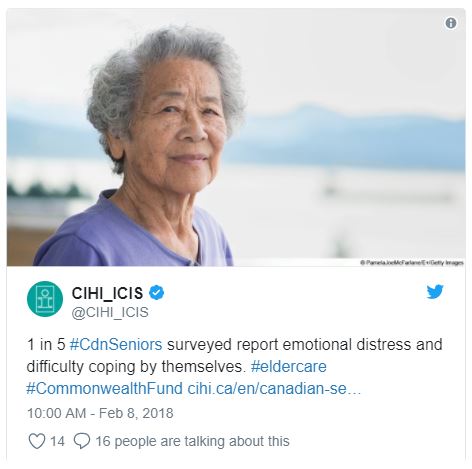風蕭蕭_Frank
以文會友Canadians giving up food, heat to pay for prescription drugs: UBC study
SCIENCE, HEALTH & TECHNOLOGY
Feb 13, 2018 | For more information, contact Alex Walls UBC School of Population and Public Health
Tel: 604-822-0530 Cel: 778-984-6173
Email: alex.walls@ubc.ca
https://news.ubc.ca/2018/02/13/canadians-giving-up-food-heat-to-pay-for-prescription-drugs-ubc-study/
The study estimated that 730,000 Canadians reduced their spending on food and 238,000 reduced their spending on home heating due to the cost of prescription drugs. Credit: Charles Williams/Flickr
More than 900,000 Canadians reduced their spending on basic necessities like food and heat to pay for prescription drugs in 2016, according to new research by a team from the University of British Columbia, Simon Fraser University, McMaster University, and The University of Toronto.
Using data from the Statistics Canada Canadian Community Health Survey, the study estimated that 730,000 Canadians reduced their spending on food and 238,000 reduced their spending on home heating due to the cost of prescription drugs.
“We knew lots of Canadians were having trouble paying for medication. Now we know they are trading off other everyday necessities in order to pay for prescription drugs,” said study lead author Michael Law, Canada Research Chair in Access to Medicines and associate professor in UBC’s school of population and public health.
An estimated 1.69 million Canadians, or 8.2 per cent of those who received a prescription in 2016, did not fill prescriptions, skipped doses, or otherwise did not take medication as prescribed because of the cost, the study found.
“Despite Canada’s reputation of having a universal healthcare system, the fact that so many people cannot afford their medicines is a sign that people are falling through the cracks,” Law said.
The study also found that not taking medicines due to cost had consequences for other parts of the health-care system. An estimated 374,000 Canadians reported using extra health-care services because they found medication unaffordable, including more than 300,000 people who reported visiting the doctor again and 93,000 who went to the emergency room.
Young adults, people with lower incomes, and those with no prescription drug insurance were more likely to report problems affording their medicines. These same characteristics also predicted additional healthcare usage and reduced spending on basic necessities. Indigenous people (i.e., those who self-identified as “Aboriginal” on the survey) were almost twice as likely to report affordability challenges, and females were twice as likely as males to report additional health system use as a result of struggling to afford medication.
Law said a range of policy issues were likely at play, including structural barriers in the health-care system such as lack of coverage, and that Canada needs to consider how to provide people with improved access to prescription drugs.
“These results suggest better coverage for these groups would lead to fewer Canadians being unable to afford their medicines and likely improve their health as a result,” said Law.
The study found drugs foregone due to cost were used for a wide variety of health conditions, with drugs that treat depression, anxiety, or other mental health conditions being the most common. Nearly one-third of respondents reported the most recently foregone prescription would have cost $50 or less, suggesting that it was not just the most expensive medications that Canadians were unable to afford.
The study was published in CMAJ Open.
Find other stories about: Michael Law, Prescription drugs, Statistics Canada Canadian Community Health Survey
| 加拿大醫療服務滿意度 低於其他發達國家 | ||
| www.bcbay.com | 2018-02-18 19:01:14 加國無憂 | 0條評論 | 查看/發表評論 | ||
|
根據一份新報告,近33%的加拿大老年人表示,他們不滿意自己得到的醫療保健服務質量,而在其他被調查的發達國家老年人不滿意率平均為24%。 加拿大衛生信息研究所的分析是基於英聯邦基金會於2016年在11個發達國家的成年人中進行調查的結果。 “老年人相當程度上依靠初級衛生保健提供者來幫助他們協調來自專家、醫院和家庭三種渠道的關懷,他們對自己的主要醫療保健提供者非常滿意,但整個醫療係統不太滿意,”多倫多CIHI的衛生係統分析和新興問題研究主管Tracy Johnson 在接受采訪時表示。“這可能與他們在獲得服務方麵麵臨一些困難有關。” 最大的問題之一是,老年人預約就診時能否獲得醫療結果。Johnson說,另一個問題是,會從醫療服務提供者那裏聽到互相矛盾或不同的信息。 隨著人們壽命的延長,他們可能會患上更多的慢性疾病。然而,衛生保健係統的設計仍然是為了解決諸如闌尾炎或需要在醫院治療的骨折等急性問題,滑鐵盧大學教授George Heckman說,他是一位專注於老齡化和心血管疾病的老年病學家。他沒有參與CIHI的報告。 Heckman說,在加拿大,衛生保健係統不太適應慢性病老年人的需求。 “慢性疾病的問題在於,你知道他們會在某個時候發作,發作時間通常會有幾周,也有機會在惡化之前發現不良征兆,最終需要在醫院接受治療,”Heckman說。“這個時候報告中強調的護理協調問題就變得更加重要。” 例如,Heckman指出,家庭護理提供者可能會注意到患者有呼吸問題,但無法與基礎醫療機構的醫生分享這些信息。 甚至有些時候,護理人員使用的都不是同一種語言。相比之下,Heckman指出,比利時的家庭護理提供者與其他衛生保健提供者使用相同的醫學術語,比如認知測試結果。他們都能夠更新病人的電子健康記錄。 他說另一個可能的解決方案是將專家嵌入到家庭保健團隊中,與醫生、護士和藥劑師一起照顧病情最複雜的患者。他的研究表明,這種做法改善了所有健保提供者治療慢性疾病的方式,而不是目前這種將傳真發送給專家,預約三個月後就診的模式。 但是,分別為醫療保健提供者提供資金使得轉移資金以促進綜合治療方法變得更難,Heckman說。 Heckman表示,該報告中包括加拿大老年人更長壽的好消息,享有初級保健服務,如家庭醫生等,並且比其他國家的老年人對健康有更好的自我感知。 該報告的作者們的研究著眼於健保滿意度的四個領域: · 獲得專家診治的機會。 · 精神健康。 · 家庭護理。 · 臨終治療。 總的來說,加拿大人在初級衛生保健提供者層麵的就醫體驗滿意度優於國際平均水平,例如常規醫生了解他們的病史,讓病人參與醫療決策,能在病人身上花費足夠的時間,並鼓勵病人提出問題。 報告的作者們說,隻有65%的能夠輕鬆聯係到醫療保健專業人員,並在就診期間向醫生提出問題。 安大略省Peterborough特倫特(Trent )大學的社會學家Stephen Katz說,由於家庭護理一直被認為是解決昂貴的醫療護理問題的辦法,因此照顧老年人的護理者中10人中隻有2人得到政府幫助就很能說明問題。卡茨研究老齡化和老年學。 老年人的戶外安全 在一封電子郵件中,Katz說,CIHI將研究限製在健康生活方式到飲食、運動和選擇感,而沒有考慮環境的安全性或交通是否適合老年人。
Heckman建議,城市和社區應設計更多適合老年人的地方,幫助那些在步行距離內有困難的老年人。例如,如果公園缺長椅或燈光不亮,那麽老年人寧可留在室內,也不與其他人一起鍛煉和社交。 CIHI作者還發現: · 三分之一的老年人患有至少三種慢性病。 · 32%的老年人服用五種或更多種常規藥物。 · 14%的人麵臨心理健康問題,如抑鬱或焦慮。 11個參與調查的國家有澳大利亞、加拿大、法國、德國、荷蘭、新西蘭、挪威、瑞典、瑞士、英國和美國。 英聯邦基金將自己描述為旨在促進高效運作的醫療保健體係的美國私人基金會。CIHI是一個獨立的非營利組織,提供有關加拿大人健康係統和加拿大人健康狀況的信息。 |
||
| 百萬加拿大人為了買這個 連飯都不吃了 | |
| www.bcbay.com | 2018-02-18 09:19:31 加國無憂 | 1條評論 | |

最新研究顯示,2016年有大約100萬加拿大人為了支付醫藥處方,無奈下隻好縮減在食物和取暖等生活必需品上的支出。
近日,由英屬哥倫比亞大學人口與公共衛生學院副教授Michael Law發表的論文顯示,2016年有73萬加拿大人省下購買食物的錢去買藥,另外23.8萬加拿大人則選擇省掉家裏的取暖費用。
“我們現在知道很多加拿大人在支付藥物的方麵遇到了麻煩,”Law說:“越來越多的人為了支付處方藥的費用,開始節省家裏其他生活必需品的開支。”
作為加拿大社區健康調查的一部分,這項研究總共在財務狀況和醫藥支出的問題上調查了28,091人。其中那些沒有保險的人,收入較低的人,以及更年輕的人,在醫藥支出上都多少遇到了麻煩。
另外研究還顯示,2016年開過處方藥的加拿大人的8.2%,大約160萬人,因為沒錢,所以並沒有購買或者買夠那些他們需要的藥物。而不吃藥更會對國家的醫療健康係統造成壓力,因為不抓緊治病延誤病情隻會令病人多次去醫院看醫生。

來自英屬哥倫比亞大學,西蒙菲莎大學,麥克馬斯特大學以及多倫多大學的研究人員表示,加拿大政府需要重新審視處方藥方麵的政策。“盡管加拿大的全民醫療體係的名聲很好,但是至今仍有人連藥都買不起,”Law說道。
加拿大是世界上唯一一個擁有全民醫療保健卻沒有普及藥物覆蓋的國家,有證據表明,加拿大的藥價僅次於美國,位居世界第二。此前卑詩省曾經宣布年收入低於3萬加元者,可以免費或者憑借減少免賠額獲取處方藥。衛生部長Adrian Dix也曾表示,年收入在1.5萬和3萬加元的人們可以不再支付任何藥物的免賠額。







